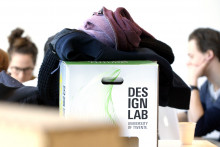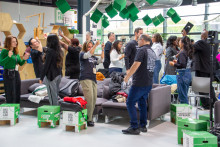The full title of the conference is ‘Human-Technology Relations: Postphenomenology and Philosophy of Technology.’ The word ‘Postphenomenology’ could throw people off. But it’s meant to identify an increasingly popular tradition within philosophy of technology that reflects on technologies shaping humans’ experiences and practices. Postphenomenology has always reached out to different fields like design, art, engineering, and scientific research to critically analyze the impact of artifacts and technologies in peoples’ lives. At this conference, all of these fields come together.
Outreach to other fields
‘That word is in the subtitle because it is an approach witin philosophy of technology in which Twente is highly active. Moreover, many big names in that specific field, like Don Ihde, are presenting their work here,’ said organizing committee member and assistant chair Roos De Jong. ‘But what they want to do is reach out to other fields. It’s not just philosophers doing their postphenomenological stuff.’
The event aims at engaging people from different fields to collaborate with philosophers’ assessments of the impact of technologies. ‘There are designers, artists, and engineers involved. We wanted to listen to different perspectives during the conference,’ said the recently graduated philosopher. ‘Theoretical discussions are important but you don’t want to limit yourself to that.’
Techno-optimism
An essential theme throughout the conference is taking a more critical stance towards the use and developments of technologies. ‘We’re quite techno-optimistic, at least here in the Netherlands. We think that we can solve all societal problems with technology. But it’s very important to understand technologies not only as instrumental tools but also as actively shaping how we perceive things. That’s why we’re not holding a ‘humans using technology conference,’ explained De Jong. ‘More and more people are now realizing how technologies, which are part of almost everything they do in their daily life, are not neutral tools, and that there’s a real human-technology interaction in which there is coshaping.’
According to De Jong, the conference started as a small initiative from the Philosophy department. ‘We thought we would be lucky to have fifty participants showing up. But it escalated really fast! Now we have 280 participants in total, of which 193 will present their work. People are coming from all over the world including Thailand, Ukraine, Chile, Hungary, and many other countries.’
The organizing team had to eventually put together 54 panels, three workshops, and six keynote talks. These events have been running in parallel sessions across different rooms of the DesignLab during the three-day conference. The response to the first edition of a human-technology relations conference suggests there are plenty more editions to come in the future.







